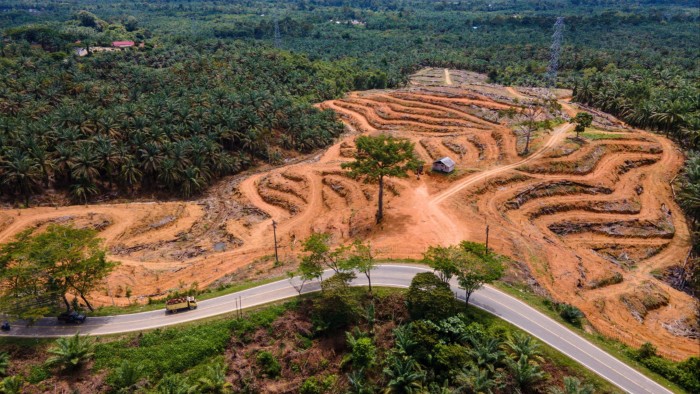Stay informed with free updates
Simply sign up to the EU business regulation myFT Digest — delivered directly to your inbox.
Indonesia has asked Brussels to further delay its landmark deforestation law, adding to mounting pressure from EU governments that have demanded policymakers cut back “onerous” requirements on producers.
The controversial ban on products coming from deforested land being sold in the bloc has been heavily criticised by several of the EU’s trading partners including Brazil and the US, which argue it will damage small producers and make trade too expensive.
Muhammad Takdir, Indonesia’s deputy ambassador to the EU, said the law — which has already been delayed until the end of this year — should be further postponed to 2028 to allow more time to prepare, and that no fines should be charged in the intervening period. He also said revisions were needed, particularly for small farmers.
“Our big companies have the ability to adapt to the implementation. But there are 8mn smallholdings, 17mn smallholders if you count families. They cannot navigate the regulation. They will be sidelined from the supply chains,” Takdir told the Financial Times.
Many farmers would not be able to provide the necessary geolocation data for their plantations, as required by the law, because they are often in areas with no mobile phone reception, he said.
The law is an important part of the bloc’s ambitious Green Deal climate law, first announced in 2019 amid a wave of environmental sentiment that swept Green parties across Europe to some of their best ever election results.
However, the bloc’s waning economy and the return of Donald Trump to the White House have prompted a surge in popularity for rightwing parties that say the EU’s green agenda is unviable and a threat to growth.
Under pressure from both EU member states and trading partners, the European Commission agreed in October to postpone the implementation of the deforestation law until the end of 2025.
But several industries and countries are saying that this is still not long enough to help them prepare for the requirements, which include logging geolocation data for where the commodity was grown that can then be cross-checked against satellite maps.
“Last year we made a case that [the law] was not ready and not much has changed,” a senior EU diplomat said.
The law covers seven commodities — cattle, cocoa, coffee, oil palm, rubber, soya and wood — and categorises countries, including those within the bloc, as either at low, standard or high risk of deforestation. Products from low-risk countries will not be subject to the full customs checks.
In a letter to the commission on Monday, agricultural ministers from 18 member states said “the requirements imposed on farmers, forest owners and operators remain onerous and not justified for countries with an insignificant risk of deforestation”.
EU lawmakers also approved a motion on Wednesday to introduce a “no risk” category aimed at exempting EU countries from the rules.
“The commission’s current approach imposes a blanket burden instead of targeting real risk,” said Christine Schnieder, a conservative German MEP who has led negotiations on the deforestation law.
Takdir said some countries were preparing to dispute the issue at the World Trade Organization. India, Colombia and others have already asked for debates in Geneva but have not filed a formal case yet.
He also said Indonesia was still hoping to conclude a trade deal with Brussels by the end of the year despite differences over some EU regulations and Jakarta’s export controls on nickel.
Meanwhile the US is putting pressure on the EU to exempt it from the law as part of its “framework” trade deal to reduce tariffs on the bloc.
The EU has already categorised the US — and all its own members — as “low risk”, which means there will be fewer due diligence checks on US products.
